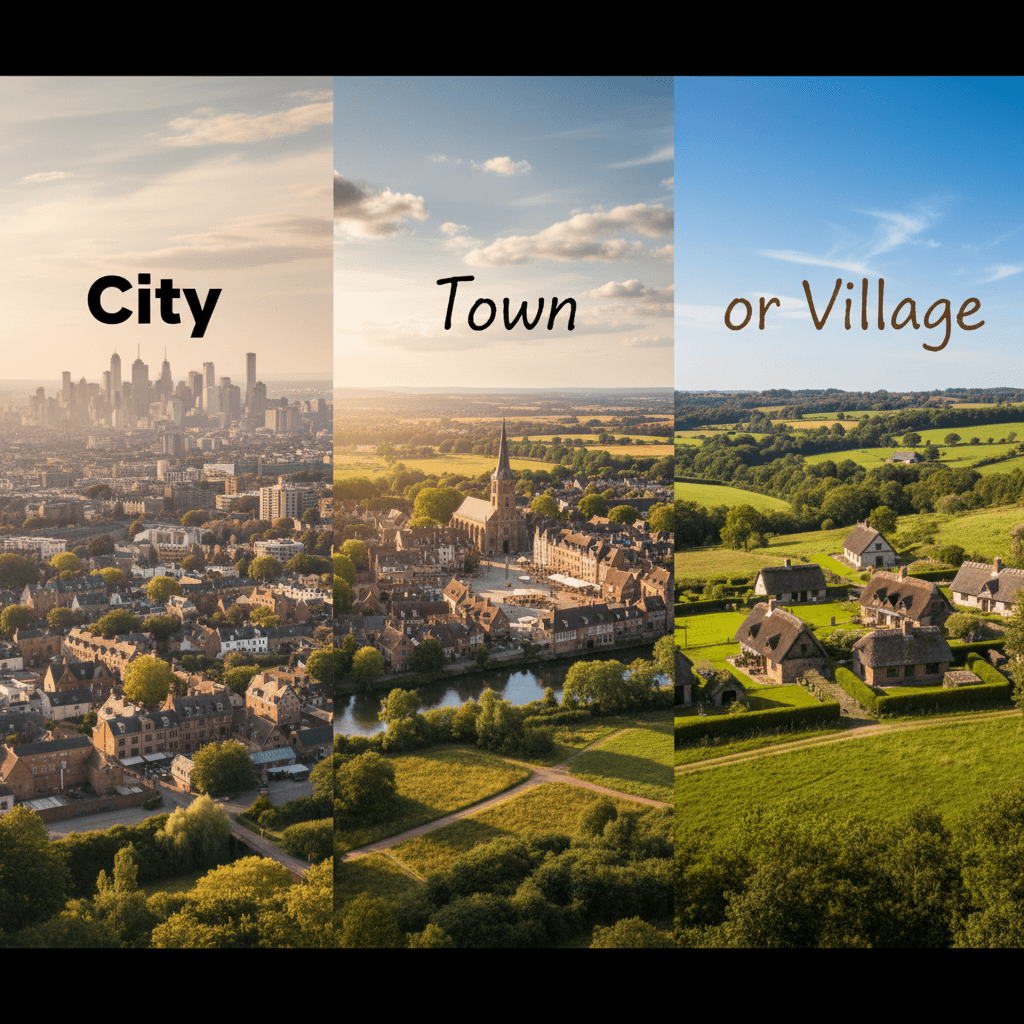City Vs Town Vs Village: What’s the Difference?
 People often use city, town, and village to describe where they live, but they don’t mean the same thing.
People often use city, town, and village to describe where they live, but they don’t mean the same thing.
The difference usually depends on population size, facilities, and government structure.
Let’s explore how each term is used and what makes them unique.
City: Large and Busy
Meaning
A city is a large urban area where a lot of people live and work.
Cities usually have advanced infrastructure, such as skyscrapers, hospitals, universities, public transport, and major industries.
Examples (10 total)
- New York City is one of the busiest cities in the world.
- Tokyo is the largest city in Japan.
- People move to the city for better job opportunities.
- London is a historic city with modern skyscrapers.
- The city never sleeps — there’s always something happening.
- A city often has airports, malls, and business centers.
- Paris is known as the city of love.
- Many people prefer the city because of its fast-paced lifestyle.
- Pollution is a common problem in big cities.
- The city government manages transport and housing systems.
🧠 Tip:
If it has tall buildings, public transport, and millions of people — it’s a city.
Town: Smaller and Friendlier
Meaning
A town is smaller than a city but larger than a village.
Towns have shops, schools, and local governments, but they don’t have the scale or population of a big city.
They usually feel more community-based and less crowded.
Examples (10 total)
- I grew up in a small town near the mountains.
- This town has one main street full of cafes.
- Every town has its own local market.
- The town library is a great place to read.
- People in the town know each other well.
- The town center is busy on weekends.
- My grandparents live in a peaceful town by the river.
- The town holds an annual fair every summer.
- The town council is responsible for street cleaning.
- It’s a quiet town, but it has everything we need.
🧠 Tip:
If it has schools, markets, and offices — but not skyscrapers or subways — it’s a town.
Village: Small and Peaceful
Meaning
A village is a small settlement, often found in rural or countryside areas.
Villages usually have fewer than a few thousand residents, and people often know everyone in their community.
Examples (10 total)
- The village is surrounded by farms and forests.
- My grandmother lives in a quiet village.
- The village has one school and a small clinic.
- Everyone in the village knows each other.
- The village festival is a yearly event.
- Electricity reached the village only a few years ago.
- The village market opens every Sunday.
- Tourists love visiting this old village.
- The village roads are narrow and peaceful.
- Most people in the village work in agriculture.
🧠 Tip:
If it’s small, calm, and far from the city — it’s a village.
Quick Comparison Table
| Feature | City | Town | Village |
|---|---|---|---|
| Population | Very large (millions) | Medium (thousands to tens of thousands) | Small (hundreds to a few thousand) |
| Location | Urban area | Suburban or semi-urban | Rural or countryside |
| Facilities | Advanced: hospitals, airports, universities | Basic: schools, markets, clinics | Limited: small shops, local school |
| Lifestyle | Fast-paced | Balanced | Slow and peaceful |
| Government | Mayor or city council | Town council | Village head or local chief |
How to Remember the Difference
👉 City = Big and busy
👉 Town = Medium and manageable
👉 Village = Small and simple
💡 Memory Trick:
“C” for City → Crowds
“T” for Town → Togetherness
“V” for Village → Vast fields
Why It’s Easy to Confuse Them
The terms can overlap depending on the country.
For example:
- In the U.K., “town” has a specific government meaning.
- In the U.S., “city” and “town” can mean the same thing depending on state law.
- “Village” is used more often in British English and rural contexts.
Even AI tools sometimes mix them up, so Humanizey helps ensure your writing stays natural and regionally consistent.
FAQs
1. Is a town bigger than a village?
Yes, a town is larger and has more services than a village.
2. Can a town become a city?
Yes. When its population grows and it develops more infrastructure, a town can be officially named a city.
3. Is “village” used in American English?
Not often — Americans say “small town” instead. “Village” is more common in British English.
4. What do we call people who live there?
- City → citizens
- Town → townspeople
- Village → villagers
Practice: Choose the Correct Word (“City,” “Town,” or “Village”)
(Answers are listed at the end.)
- London is the capital ___ of England.
- I grew up in a quiet ___ surrounded by farms.
- The ___ has a population of over five million.
- Our ___ holds a market every weekend.
- My grandparents still live in their old ___.
- This small ___ doesn’t have a hospital yet.
- Tokyo is one of the biggest ___ in the world.
- Every ___ has a mayor and a council.
- We visited a mountain ___ during our trip.
- The ___ center is full of offices and restaurants.
Answers
- city
- village
- city
- town
- village
- village
- cities
- city
- village
- city
